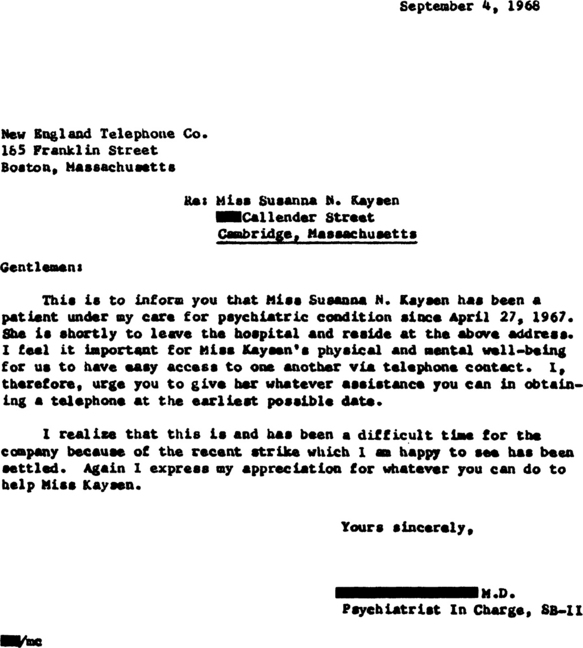
The hospital had an address, 115 Mill Street. This was to provide some cover if one of us were well enough to apply for a job while still incarcerated. It gave about as much protection as 1600 Pennsylvania Avenue would have.
“Let’s see, nineteen years old, living at 1600 Pennsylvania Avenue—Hey! That’s the White House!”
This was the sort of look we got from prospective employers, except not pleased.
In Massachusetts, 115 Mill Street is a famous address. Applying for a job, leasing an apartment, getting a driver’s license: all problematic. The driver’s-license application even asked, Have you ever been hospitalized for mental illness? Oh, no, I just loved Belmont so much I decided to move to 115 Mill Street.
“You’re living at One fifteen Mill Street?” asked a small, basement-colored person who ran a sewing-notions shop in Harvard Square, where I was trying to get a job.
“Uh-hunh.”
“And how long have you been living there?”
“Oh, a while.” I gestured at the past with one hand.
“And I guess you haven’t been working for a while?” He leaned back, enjoying himself.
“No,” I said. “I’ve been thinking things over.”
I didn’t get the job.
As I left the shop my glance met his, and he gave me a look of such terrible intimacy that I cringed. I know what you are, said his look.
What were we, that they could know us so quickly and so well?
We were probably better than we used to be, before we went into the hospital. At a minimum we were older and more self-aware. Many of us had spent our hospital years yelling and causing trouble and were ready to move on to something else. All of us had learned by default to treasure freedom and would do anything we could to get it and keep it.
The question was, What could we do?
Could we get up every morning and take showers and put on clothes and go to work? Could we think straight? Could we not say crazy things when they occurred to us?
Some of us could; some of us couldn’t. In the world’s terms, though, all of us were tainted.
There’s always a touch of fascination in revulsion: Could that happen to me? The less likely the terrible thing is to happen, the less frightening it is to look at or imagine. A person who doesn’t talk to herself or stare off into nothingness is therefore more alarming than a person who does. Someone who acts “normal” raises the uncomfortable question, What’s the difference between that person and me? which leads to the question, What’s keeping me out of the loony bin? This explains why a general taint is useful.
Some people are more frightened than others.
“You spent nearly two years in a loony bin! Why in the world were you in there? I can’t believe it!” Translation: If you’re crazy, then I’m crazy, and I’m not, so the whole thing must have been a mistake.
“You spent nearly two years in a loony bin? What was wrong with you?” Translation: I need to know the particulars of craziness so I can assure myself that I’m not crazy.
“You spent nearly two years in a loony bin? Hmmm. When was that, exactly?” Translation: Are you still contagious?
I stopped telling people. There was no advantage in telling people. The longer I didn’t say anything about it, the farther away it got, until the me who had been in the hospital was a tiny blur and the me who didn’t talk about it was big and strong and busy.
I began to feel revulsion too. Insane people: I had a good nose for them and I didn’t want to have anything to do with them. I still don’t. I can’t come up with reassuring answers to the terrible questions they raise.
Don’t ask me those questions! Don’t ask me what life means or how we know reality or why we have to suffer so much. Don’t talk about how nothing feels real, how everything is coated with gelatin and shining like oil in the sun. I don’t want to hear about the tiger in the corner or the Angel of Death or the phone calls from John the Baptist. He might give me a call too. But I’m not going to pick up the phone.
If I who was previously revolting am now this far from my crazy self, how much further are you who were never revolting, and how much deeper your revulsion?